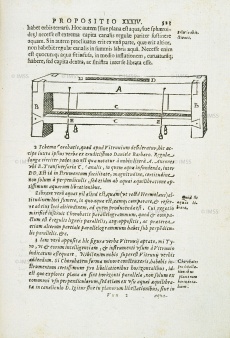Chorobates
From Inventions
m (1 revision) |
|||
| Line 1: | Line 1: | ||
{{Template invention | {{Template invention | ||
| - | |nome= | + | |nome= |
| + | Name documented by Vitruvius (in Latin "chorobate"). | ||
|inventore= | |inventore= | ||
| Line 7: | Line 8: | ||
|data= | |data= | ||
| - | |descrizione= | + | |descrizione= |
| + | Instrument of ancient origin for levelling canals and water conduits. Vitruvius, who called it "chorobate", describes it as being more precise that a [[Bubble Level | bubble level]]. The instrument consisted of a rule twenty feet (approx. 6 m) long with supports at both ends. Beneath the rule, firmly fixed to the supports, were two crosspieces marked with lines to indicate perpendicularity. Either two or four plumb bobs hanging from the rule indicated the horizontal position on the lines marked on the crosspieces. | ||
|componenti= | |componenti= | ||
Revision as of 12:47, 13 November 2009
Name documented by Vitruvius (in Latin "chorobate").
Description
Instrument of ancient origin for levelling canals and water conduits. Vitruvius, who called it "chorobate", describes it as being more precise that a bubble level. The instrument consisted of a rule twenty feet (approx. 6 m) long with supports at both ends. Beneath the rule, firmly fixed to the supports, were two crosspieces marked with lines to indicate perpendicularity. Either two or four plumb bobs hanging from the rule indicated the horizontal position on the lines marked on the crosspieces.
Bibliographical Resources
Vitruvio (Vitruvius Pollio, Marcus). De Architectura, a cura di Pierre Gros, Einaudi, Torino, 1997, 2 voll., Lib. VIII, cap. V (vol. II, p. 1137).
Images
Mario Bettini. Aerarium philosophiae mathematicae : in quo elementa philosophiae geometricae de planis, curuis, & solidis figuris applicata et ornata, vsibus eximijs in omni scientiarum & artium genere, nouis praxibus, paradoxis, locis Aristotelicis & aliorum philosophorum & scriptorum, corollarijs, scholijs, eruditionibus, moralitatibus, demonstrationibus nouis, facillimis & vniuersalissimis confirmata. Bologna, 1648, p.523 |
Author of the entry: Filippo Camerota

